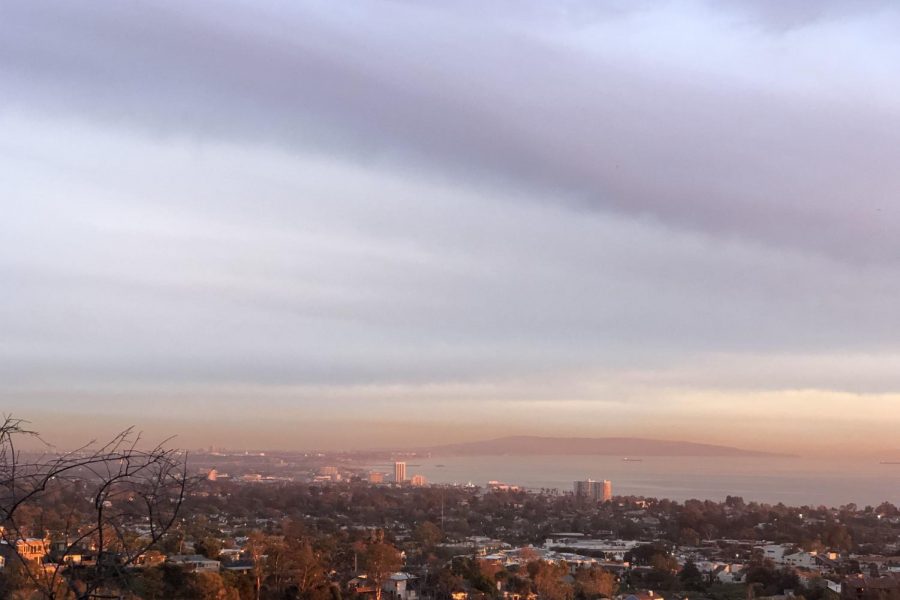Column: Dear Brother
Photo credit: Abigale Lischak
From Temescal Canyon hiking trail in the Pacific Palisades, a layer of smog and air pollution can be seen looming over Los Angeles’ coastal cities.
March 3, 2020
The following is a letter response to various conversations I have had with friends and acquaintances. The letter is written to the metaphorical ‘brother,’ as we are all brothers and sisters in this world.
Dear Brother,
I strongly believe no person is intentionally and maliciously attempting to harm other people in this world. Therefore, I ask that you read the following with an open mind. I have written the following for you to consider prior to the upcoming election. Climate change is an issue that should, and can, transcend all political parties; however, in the upcoming election, it is evident the issue will not. Unfortunately, the Democratic candidates are the only ones who have made a commitment to fight for our planet.
I will start with the basics — climate change is real.
In 2018, the Intergovernmental Panel on Climate Change (IPPC) released a report that shocked the world with unprecedented news. The IPCC is an organization commissioned by the UN composed of scientists from across the globe. According to their website, the bipartisan intergovernmental group “was created to provide policymakers with regular scientific assessments on climate change, its implications and potential future risks, as well as to put forward adaptation and mitigation options.”
You have argued that climate change “is not that serious.” Yet, the IPCC report presented clear research that depicts a bleak future for the planet.
You must understand the conclusions of that report before you make blanket statements about the issue. A 2 C global temperature increase, the limit agreed upon in the Paris Agreement, is too much. Even with a 1.5 C increase, we will experience storms more powerful than ever, death of ocean ecosystems and mass food shortages. A 1.5 C global temperature increase was labeled the “best worst-case scenario” — the worst the environment can get while still being liveable. But don’t be fooled — we know that the drought, heatwaves and rising sea levels exacerbated by this temperature increase will threaten millions of lives.
To limit the temperature increase to 1.5 C, a drastic change must be made by 2030. Emission levels must be cut by 45% by 2030 and net-zero by 2050.
The Democratic candidates all plan to fight climate change. Joe Biden, following the IPCC recommendation, has a plan to get to net-zero emissions by 2050. Elizabeth Warren and Bernie Sanders have more ambitious plans to get to net-zero closer to 2030.
The only Republican candidate — Donald Trump — does not have a plan for climate action because he believes it is a hoax. He pulled the United States out of the Paris Climate Agreement. He continues to champion opening off-shore drilling sites. And his campaign site boasts of providing financing for coal and fossil fuel projects, primary contributors to greenhouse gas emissions.
It is evident that if you fail to vote a president into office in 2020 who will take action against climate change, we will not make the cut-off for stopping its deadly repercussions.
You have argued that this issue is not important enough to “overturn the entire economy.” Fun fact: the 2 C limit was originally introduced by William Nordhaus, a Nobel Prize-winning economist. The IPCC report estimates the planet warming 1.5 C will cost the world $54 trillion and the planet warming 2 C will cost $69 trillion.
I ask you to think back to recent natural disasters. The costliest hurricanes have occurred in the past 15 years: in 2005, damage from Hurricane Katrina cost $160 billion, Hurricane Harvey (2017) damages cost $125 billion, Hurricane Maria (2017) damages cost $90 billion and Hurricane Dorian (2019) damages cost $4.6 billion. Natural disasters are creating an increasing economic threat. In 2018, California’s Camp Fire created $16.5 billion in damage, the most expensive in US history. All of these costs fail to include the economic toll on tourism, daily activities and local industries. Hurricane Harvey took an additional toll of about $30 billion on the economy due its impediment to oil production and tourism.
The message is clear, the world economy will continue to be hit hard if no action is taken to combat climate change.
So if you choose to support a presidential candidate based on the economy, I ask you to think beyond this year. And if you are thinking of not voting, I ask you to think again. What will the economy look like when these record-breaking natural disasters are occurring even more frequently? How much will each additional disaster cost? Where will we get the funds and resources? How will we recover?
You say, “I will not pick a candidate based on a single issue.” In a normal election, I commend your critical thinking. In this election, I beg for you to reconsider; in this election, one side is desperately fighting against climate change, while the other denies that it’s even real. As the research has stated, we do not have the time for you to choose based on any other issue. If Donald Trump is elected again in 2020, he will be president until 2024; we will only have six years left to cut emissions and reduce the additional damage he creates. That is not enough time.
Vote for the climate in this next election. Each candidate is flawed, but if you vote, or do not vote, in this election based on topics like tax, healthcare or relationships with Russia, you will look back on that choice when you are in the midst of toxic air pollution, when a fire is engulfing or a hurricane is destroying your home. I will have nothing to say to you, and you will remember I pleaded with you and you chose to ignore the research when we still had a chance.
With love,
Your Sister
Correction Statement (March 3, 2020, 5:45 p.m.): A previous version of this article contained paraphrased text messages sent to the columnist. The image was replaced to maintain the privacy of the sender.









